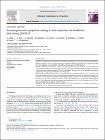| dc.contributor.author | Cahill, Joan | |
| dc.contributor.author | Kay, Alison | |
| dc.contributor.author | Howard, Vivienne | |
| dc.date.accessioned | 2022-04-01T14:34:46Z | |
| dc.date.available | 2022-04-01T14:34:46Z | |
| dc.date.issued | 2022 | |
| dc.date.submitted | 2022 | en |
| dc.identifier.citation | J. Cahill, A. Kay, V. Howard, B. Mulcahy, M. Forde, S. George, E. Ziampra, F. Duffy, G. Lacey, F. Fitzpatrick, Personal protective equipment training & lived experience for healthcare staff during COVID-19, Clinical Infection in Practice, 2022 Mar 23:100142 | en |
| dc.identifier.issn | 2590-1702 | |
| dc.identifier.other | Y | |
| dc.identifier.uri | http://hdl.handle.net/2262/98385 | |
| dc.description.abstract | Objectives: To describe the lived experience of healthcare staff during the Coronavirus Disease 2019 (COVID-19) pandemic relating to the use of personal protective equipment (PPE) and investigate risks associated with PPE use, error mitigation and acceptability of mindfulness incorporation into PPE practice.
Methods: A qualitative human factors' study at two Irish hospitals occurred in late 2020. Data was collected by semi-structured interview and included role description, pre-COVID-19 PPE experience, the impact of COVID-19 on lived experience, risks associated with PPE use, contributory factors to errors, error mitigation strategies and acceptability of incorporating mindfulness into PPE practice.
Results: Of 45 participants, 23 of whom were nursing staff (51%), 34 (76%) had previously worn PPE and 25 (56%) used a buddy system. COVID-19 lived experience impacted most on social life/home-work interface (n=36, 80%). Nineteen staff (42%) described mental health impacts. The most cited risk concerned 'knowledge of procedures' (n=18, 40%). Contributory factors to PPE errors included time (n=15, 43%) and staffing pressures (n=10, 29%). Mitigation interventions included training/education (n=12, 40%). The majority (n=35, 78%) supported mindfulness integration into PPE practice.
Conclusions: PPE training should address healthcare staff lived experiences and consider incorporation of mindfulness and key organisational factors contributing to safety. | en |
| dc.language.iso | en | en |
| dc.relation.ispartofseries | Clinical Infection in Practice; | |
| dc.relation.ispartofseries | Volume 14; | |
| dc.rights | Y | en |
| dc.subject | COVID-19 | en |
| dc.subject | Healthcare staff | en |
| dc.subject | Human factors | en |
| dc.subject | Lived experience | en |
| dc.subject | Personal Protective Equipment | en |
| dc.title | Personal protective equipment training & lived experience for healthcare staff during COVID-19 | en |
| dc.type | Journal Article | en |
| dc.type.supercollection | scholarly_publications | en |
| dc.type.supercollection | refereed_publications | en |
| dc.identifier.peoplefinderurl | http://people.tcd.ie/jocahill | |
| dc.identifier.peoplefinderurl | http://people.tcd.ie/vhoward | |
| dc.identifier.peoplefinderurl | http://people.tcd.ie/kayam | |
| dc.identifier.rssinternalid | 241874 | |
| dc.identifier.doi | 10.1016/j.clinpr.2022.100142 | |
| dc.rights.ecaccessrights | openAccess | |
| dc.subject.TCDTheme | Immunology, Inflammation & Infection | en |
| dc.subject.TCDTag | PPE | en |
| dc.subject.TCDTag | WELL-BEING | en |
| dc.subject.TCDTag | Work Related Stress | en |
| dc.subject.TCDTag | health and safety | en |
| dc.identifier.orcid_id | 0000-0001-6944-744X | |
| dc.contributor.sponsor | Science Foundation Ireland (SFI) | en |
| dc.contributor.sponsorGrantNumber | 20/COV/0111 | en |




